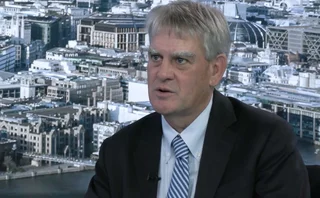
House of the year, Japan: BNP Paribas
Asia Risk Awards 2017

The Bank of Japan’s continued commitment to buy Japanese government bonds – back in July it offered to buy unlimited amounts of 10-year JGBs with a yield of 0.11% – as part of its stimulus programme suggests that investors have to look elsewhere in search of better returns. Even as risk aversion returns and global yields continue to creep up, the central bank is not expected to let up on its easing programme any time soon, which means limited upside on JGB yields.
BNP Paribas Japan has been a market leader in providing funding for domestic investors looking to enhance yields in other asset classes and geographies. The bank remains the number one foreign JGB dealer in Japan and is an active participant in the BoJ’s buying operations and auctions conducted by the Ministry of Finance.
“Our balance sheet and market-making capability continues to be one of the best in the market,” says Hiroyuki Kazama, head of structuring for global markets in Japan. “We have tons of patterns and resources for providing reverse repo or repo security type collateral as funding solutions for clients. As a European bank, we can also offer cross-asset and cross-geography approaches.”
A popular request from Japanese investors is to be able to get funding in order to expand investments overseas. To meet this, BNP Paribas offers and transacts JGBs against USD cash cross-currency repos. The French lender also provides illiquid USD asset-backed reverse repos (such as US exchange-traded funds and collateralised loan obligations) for clients with USD-denominated assets that are not applicable for use in a typical repo market arrangement.
As a bank renowned for its structured products capabilities, BNP Paribas has also been active in providing cash-like investment solutions to clients who are looking to enhance their bond portfolio yield while minimising market risk. Over the past year, the bank has executed a combination of reverse repos on investment grade securities and repos on government bonds as well as other asset classes.
The combinations run across the complete range – with examples such as US Treasuries/JGBs, euro government bonds/JGBs, US Treasuries/Japanese equity, AUD private placements/JGBs all being popular. These transactions can be documented under the Global Master Securities Lending Agreement or Japanese law-based agreements, depending on the client’s needs.
“We benefit from the trust of clients who know us as a counterparty bank,” says Kyoya Okazawa, head of institutional clients for global markets in Asia. “They are happy doing vanilla repos with us, but they know we can easily do bespoke solutions as well. And because of our position as a flow powerhouse, they know we can execute.”

As a mark of its continued long-term commitment to the Japanese markets, BNP Paribas has grown its extensive presence in the socially responsible investment (SRI) and environmental, social and governance (ESG) investment segments. Signs are emerging that the industry is on the lookout for big transactions. In July, the Government Pension Investment Fund of Japan selected three ESG indexes that it will track for around ¥1 trillion ($9 billion) worth of investments, while Taiyo Life Insurance announced plans to invest up to ¥100 billion in ESG assets.
Okazawa explains that sovereigns and major Japanese wealth funds are increasingly looking into growing their green portfolio as it makes sense to do so for asset replenishment purposes.
“Fund managers today find it hard to reinvest in government bonds because rates are too low. Their cost of liability is much higher in today’s environment. So they need to replace the ‘govvies’ portfolio with something and this is where ESG comes in. Investment durations are longer and there are expectations that more investors will come into this space, thus creating performance,” he says.
BNP Paribas arranged six SRI issuances between October last year and May this year, the largest of which was a $50 million ESG bond issued by Malaysia’s Maybank. The bonds were all successfully marketed and sold to Japanese investors. “It is not just an ideological drive; ESG and SRI are the right investments in the right space. BNP Paribas is in a position to provide know-how in this area as well as the ability to execute in size,” says Okazawa.
From a product standpoint, one particular highlight for BNP Paribas this year are the collateralised loan obligations (CLOs) that it has been offering to Japanese investors. These products have seen an uptick in demand from banks that are re-examining their duration risk with a view to investing in floating-rate investments. Amid this backdrop, Japanese investors, including major funds and insurance companies, have increasingly invested in CLOs due to their superior risk/return properties.
As an active arranger and dealer for CLO paper in Japan, BNP Paribas was the first bank – back in 2014 – to develop JPY CLO repackaged notes with balance guarantee swaps. With a tightening of the USD/JPY cross-currency basis markets, the bank is now seeing renewed interest in these products from Japanese clients.
“US and European CLOs have been a very popular product for Japanese investors in a low rate environment because of their superior risk and return profile,” says Go Matsui, head of credit structuring global markets at BNP Paribas. “The structure of CLOs is more conservative now and the spreads offered by CLOs are a lot better than what you can get with other investment grade credit. With excess JPY liquidity, there is increasing demand for the product in JPY repackaged format, but very few firms can offer JPY repacks of USD/EUR CLO, because the risk management of such balance guarantee cross-currency swaps is quite complex. We are actively offering JPY CLO repackaged notes to the market now.”
Only users who have a paid subscription or are part of a corporate subscription are able to print or copy content.
To access these options, along with all other subscription benefits, please contact info@risk.net or view our subscription options here: http://subscriptions.risk.net/subscribe
You are currently unable to print this content. Please contact info@risk.net to find out more.
You are currently unable to copy this content. Please contact info@risk.net to find out more.
Copyright Infopro Digital Limited. All rights reserved.
As outlined in our terms and conditions, https://www.infopro-digital.com/terms-and-conditions/subscriptions/ (point 2.4), printing is limited to a single copy.
If you would like to purchase additional rights please email info@risk.net
Copyright Infopro Digital Limited. All rights reserved.
You may share this content using our article tools. As outlined in our terms and conditions, https://www.infopro-digital.com/terms-and-conditions/subscriptions/ (clause 2.4), an Authorised User may only make one copy of the materials for their own personal use. You must also comply with the restrictions in clause 2.5.
If you would like to purchase additional rights please email info@risk.net
More on Awards
Collateral management and optimisation product of the year: CloudMargin
Delivering the modern blueprint for enterprise collateral resilience
Flow market-maker of the year: Citadel Securities
Risk Awards 2026: No financing; no long-dated swaps? “No distractions,” says Esposito
Pricing and analytics: fixed income – Quantifi
Quantifi delivers high-performance, transparent and adaptable pricing and risk analytics for fixed income and credit markets
Derivatives house of the year: Citi
Risk Awards 2026: Rev up, RWAs down, as US bank gets back on track (with added XiNG and XiP)
Technology vendor of the year: SS&C Algorithmics
Risk Awards 2026: From cloud, to chips, to maths tricks – vendor getting more out of existing tech
SS&C Algorithmics: winner’s interview with Curt Burmeister
SS&C Algorithmics wins three categories in this year’s Markets Technology Awards in addition to Technology vendor of the year at the Risk Awards
Best vendor for system support and implementation: Murex
Murex wins Best vendor for system support and implementation at the Markets Technology Awards 2026
Pricing and analytics: cross-asset and structured – Murex
Murex wins Pricing and analytics: cross-asset and structured at the Markets Technology Awards 2026 thanks to its MX.3 platform







